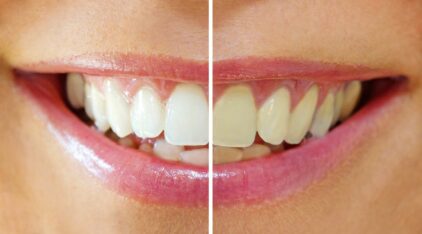The holiday season seems to start earlier and earlier each year which, for many people, means longer and longer periods of heightened stress, say integrated health specialists Dr. Michael Gelb and Dr. Howard Hindin.
“For many people, stress causes teeth grinding – bruxism – during the day or while they’re asleep at night and it’s not as innocuous as it sounds. It not only wears down the enamel of the teeth, it can cause headaches, muscle pain and disrupted sleep, which leads to daytime drowsiness and irritability,” says Dr. Hindin of the Hindin Center for Whole Health Dentistry (www.hindincenter.com), who partners with Dr. Gelb in tackling chronic disease with multidisciplinary approaches.
“Bruxism is the third most frequent abnormal sleep behavior – sleep talking and sleep walking are other examples — and the No. 1 reason patients come to my clinic, even though they’re often not aware they’re grinding,” says Dr. Gelb of The Gelb Center in New York, a holistic dentist known worldwide for pioneering integrative treatments. “Stress is generally the cause of daytime teeth grinding, which is an involuntary clenching of the jaws. But great joy can be a cause, too. Nighttime grinding can have many causes – or no clear cause at all.”
We consulted with Dr. David Perkins of AuthorityDental.org for his comment, and he said the following: “It’s difficult to diagnose teeth grinding, especially when done in one’s sleep. We see this as an increasingly difficult problem among patients with dentures. I’ve had cases where I’ve recommended Fixodent over permanent denture repair (which, in our office, are upwards of $200 without insurance) because it’s often a chronic condition. A permanent repair is expensive, and if a patient is likely to continue grinding his or her teeth, a temporary solution like Fixodent is more cost-efficient than continually modifying the denture base post-grind.”
Drs. Hindin, Perkins, and Gelb share some of the causes of teeth grinding and what people can do about it:
- 1 in 4 people with obstructive sleep apnea are bruxers: Like nighttime teeth grinding, people with sleep apnea are often unaware they have a problem, so if the grinding leads to a diagnosis of sleep apnea, it could save the person’s life. People with untreated sleep apnea can stop breathing hundreds of times a night. Those with severe cases are 46 percent more likely to die prematurely, according to a study published in 2009 in PLOS Medicine journal. “Your doctor or dentist should explore the possibility of obstructive sleep apnea as a potential cause of your bruxism,” says Dr. Hindin.
- Caffeine, alcohol, cigarette smoking, and hypertension are all linked to increased incidence of bruxism: People who have a drink before they go to bed and people who ingest caffeine are more likely to be teeth grinders, with the likelihood increasing the more a person consumes. Cigarette smoking and high blood pressure are also associated with teeth grinding, as are certain drugs used to treat depression. It may lead to other issues such as gum disease if teeth are not properly cared for. This can be soothed by looking into how the anti-inflammatory properties of CBD may aid with dental gum disease, but this must first be discussed with a doctor.
- Nighttime dental guards are just one option for treatment: Depending on the cause of the bruxism, there are a variety of treatment options, ranging from dental guards to botox injections to anti-anxiety medications. “To effectively address the problem, the cause needs to be diagnosed if possible and treated,” says Dr. Gelb. “Bruxism can cause irreversible damage to your teeth, TMJ disorders and other problems and, as Dr. Hindin pointed out, it can be a sign of a more serious underlying problem, so it shouldn’t be ignored.”
Nonetheless, any problem pertaining to your dental health should not be ignored, and while the other disorders could be treated through medication, the beautification of your teeth requires professional skills. A specialist cosmetic dentist like the ones from Grand Family Dentistry (visit them at https://www.grandfamilydentistry.com) could be your saving grace in this situation.
But that doesn’t mean that everyone who grinds is in for a hefty medical bill. “For some people, treatment may be as simple as a $10 night guard purchased at the drug store – although a custom-fitted night guard is best.”
Dr. Michael Gelb is an innovator in the airway, breathing, sleep, and painful TMJ disorders pioneering Airway Centric. He has studied early intervention for sleep-disordered breathing (SDB) specializing in how it relates to fatigue, focus, pain and the effects all of these can have on family health. Dr. Gelb received his D.D.S. degree from Columbia University School of Dental and Oral Surgery and his M.S. degree from SUNY at Buffalo School of Dental Medicine.
Dr. Howard Hindin is trained in all aspects of general dentistry. Since the 1990s, his practice has also focused on cosmetic dentistry, temporomandibular joint disorders and craniofacial pain. He is a graduate of New York University College of Dentistry.



